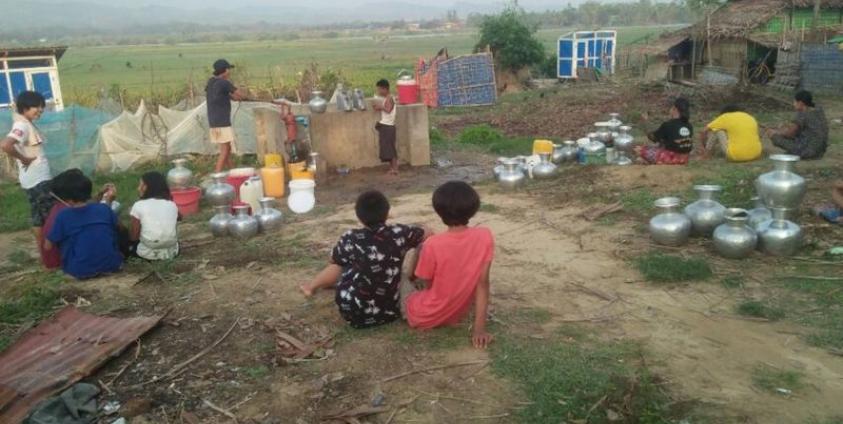According to the internally displaced persons (IDPs) in Buthidaung Township, Rakhine State, they have not received any aid except for 14 cans of rice, a small amount of oil, and salt per IDP, even two weeks after the cyclone struck.
Currently, the cyclone-affected people in Rakhine State are facing urgent needs for essential supplies such as food, clean drinking water, and shelter. However, even after a period of 14 days since the cyclone struck, local residents have reported to the Narinjara news agency that aid has not yet reached them.
In the present situation, in Buthidaung Township, 100 thatches are priced at 20,000 kyats, while 100 bamboos can cost up to 200,000 kyats. Due to these high prices, it is challenging for the displaced individuals to reconstruct their destroyed houses, leading them to sleep under trees without shelter.
The cyclone that struck Rakhine State on May 14 had a significant impact, affecting approximately 1,156,796 people. Tragically over 400 individuals lost their live according
to NUG figures and hundreds more are unaccounted for from Rohingya camps.
The destruction caused by the cyclone resulted in the loss of 241,071 buildings and 716 vehicles and vessels. Additionally, 27,617 domestic animals perished. The Rakhine State Council has released an official statement stating that the estimated total value of the damage amounts to 4,898.6 million kyats.
U Ye Kyaw, the person in charge of Lan Ma camp, informed Narinjara that the pre-collected food supplies were dampened by rainwater as a result of the cyclone. Consequently, the IDPs are facing difficulties in accessing and consuming food properly.
"The cyclone wreaked havoc on the Lan Ma IDP camp, flattening more than 20 houses and leaving them without roofs. We are facing multiple challenges, including a lack of food and water. The camp's water source, previously sustained by continuous pumping, is now inaccessible due to power outages. Our only hope for water lies in the rainfall, but its origin in the mountains raises concerns about its safety and our health," he said.
According to U Ye Kyaw, in charge of the camp, the township administration has provided 14 cans of rice, a small amount of oil and salt per resident for more than 20 homes that were completely destroyed. Furthermore, he mentioned that no organization has provided any support until 14 days after the cyclone struck.
According to U Mandala, the deputy chief of Yan Aung Myay camp, during the government team's visit to U Ottama Hall in Buthidaung Township on May 19, they only provided assistance to the 13 houses that were completely destroyed.
"The government team provided each household in the 13 completely destroyed houses with 4 pyi of rice and half a liter of oil. Unfortunately, when the cyclone struck, the collected rice and food got soaked in the rain, leaving us without any food for the following day due to the combined impact of the wind and rain," said U Mandala.
Sayadaw U Mandala expressed concerns regarding the difficult conditions faced by IDPs, emphasizing that aside from food, access to drinking water is a pressing issue. The lack of water increases the risk of skin diseases and diarrhea among the IDPs. There are also concerns about insufficient medicine to address common ailments such as cold, runny nose and fever.
U Ye Kyaw mentioned that while some of the damaged houses are being repaired solely by the residents themselves, others are being protected from the rain using materials such as tarpaulin. The IDP camp was established on September 4, 2019.
As of now, in Lan Ma IDP camp, U Ye Kyaw reported that a total of 214 households, consisting of 1,034 individuals, have sought shelter. These households originate from various villages, including Tha Yet Pyin, U Yin Thar, Shi Shar Taung, Sango Taung, Nwar Yone Taung, Kyar Nyo Pyin, Kun Taung, Sa Par Htar, Thaing Ta Poke, Thapyay Seik, Si Taung, and Kun Taing in Buthidaung Township, as well as Tha Peik Taung, Myo Ma Chaung, Ohn Chaung, Kyauk Tan, and Yae Soe Chaung in Rathedaung Township.
In the Yan Aung Myay IDP camp located in Ward No. 5, Buthidaung Township, IDPs have reported that 13 houses were completely destroyed by the cyclone. Additionally, approximately 50 percent of the remaining houses in the camp have suffered partial damage due to the impact of the cyclone.
"I am deeply concerned about the current hot and rainy weather. Our supply of medicines is insufficient, and we are grappling with challenges related to sewage. The primary needs right now are drinking water and rice. The water level in the existing well was only about a foot, which was inadequate to meet the needs of all camp residents. The scarcity of drinking water increases the risk of people falling ill with acute diseases and experiencing diarrhea. If such a situation arises, the available medicine will not be enough to address the health issues," he said.
The Yan Aung Myay IDP camp was established in March 2019 and is currently providing shelter to 503 individuals from 153 families. These IDPs originate from six villages, namely Sango Taung, Nwar Yone Taung, Shi Shar Taung, U Yin Thar, Tha Yet Pyin, and Sa Par Htar villages in Buthidaung Township.
Buthidaung Township comprises several IDP camps, including Yan Aung Myay Camp, Mya Taung Camp in Ward No. 7, Lan Ma Camp in Ward No. 2, and Gan Dar Yi Camp in Ward No. 1. Additionally, there is a Done Thein IDP camp located in Done Thein Village within Buthidaung Township.
According to the Military Council, Cyclone Mocha caused extensive damage of up to 90% in multiple townships of Rakhine State, including Sittwe, Rathedaung, Ponnagyun, Kyauktaw, Mrauk U, Maungdaw, Buthidaung, Minbya, and Pauktaw.







